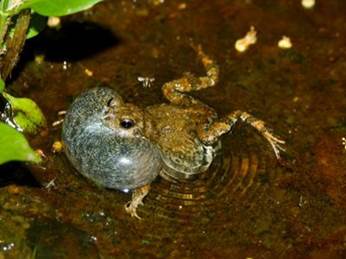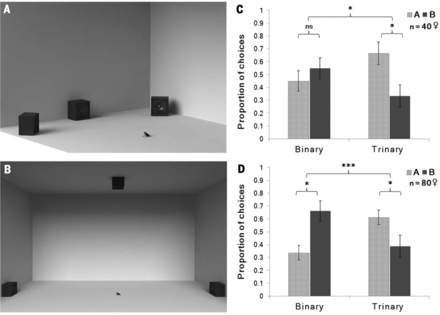


在试图选择配偶时,雌性会选择两个雄性中的更“有吸引力”的那个是毫不奇怪的——然而,一项新的研究揭示,雌性泡蟾容易受到“诱饵”效应的影响,即当有第三个选项介入时,雌性泡蟾会在头2个雄性选项中挑选吸引力较差的那个。
本研究的这些结果与目前在性选择理论中所用的理性选择模型相悖。为了检测蛙类交配选择中这种效应发生的情况,Amanda Lea 和 Mike Ryan 用80只雌性泡蟾来做实验,这些泡蟾已知会被雄性低频和持续时间长的叫声所吸引。他们接着确认了3种不同的叫声变异,并对雌性对其中每一个叫声变异的偏爱程度进行了检测。尽管叫声B与叫声A相比是更受欢迎的选择,但雌性泡蟾会在出现作为诱饵的泡蟾时明显更容易选择处在中间的目标A。注意到这种效应与该诱饵叫声是在某特定地点或是在一个难辨识的地点被觉察到无关。作者们提出,在诸如这种复杂的社会性处境中,理性选择会耗费时间,并因而可能导致失去交配的机会或带来将自己进一步暴露于掠食动物的风险。
这一研究的结果凸显了在配偶选择时环境的影响力会有多大,它们与我们了解性对象选择时的显著意义有关。需要做进一步的研究以更好地理解“诱饵”效应在适合性最大化中的作用。(来源:生物360)
Irrationality in mate choice revealed by túngara frogs
Abstract Mate choice models derive from traditional microeconomic decision theory and assume that individuals maximize their Darwinian fitness by making economically rational decisions. Rational choices exhibit regularity, whereby the relative strength of preferences between options remains stable when additional options are presented. We tested female frogs with three simulated males who differed in relative call attractiveness and call rate. In binary choice tests, females’ preferences favored stimulus caller B over caller A; however, with the addition of an inferior “decoy” C, females reversed their preferences and chose A over B. These results show that the relative valuation of mates is not independent of inferior alternatives in the choice set and therefore cannot be explained with the rational choice models currently used in sexual selection theory.
原文链接:http://www.sciencemag.org/content/349/6251/964.full.pdf



